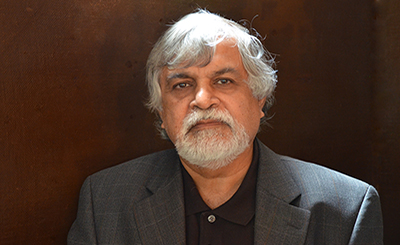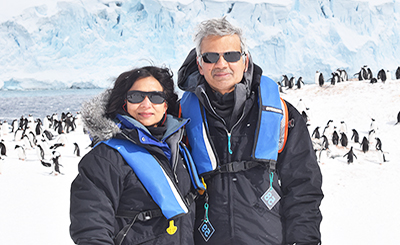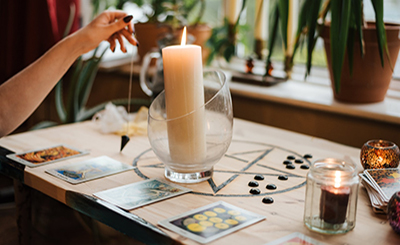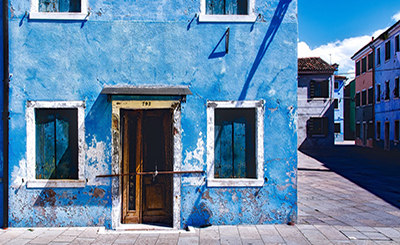
Priya Sarukkai Chabria. Photo courtesy of the poet
Poet’s Note: ‘Writing poetry is a phenomenon akin to prayer’
Writing poetry is for me both enchantment and intuition and a phenomenon akin to prayer; it makes me feel intensely alive. The poet is submerged into the self’s mysterious waters as she seeks words to illumine life’s experiences; then she’s pulled outward to share her discoveries with unknown readers. In a sense, writing poetry is analogous to the effect the pandemic has had on us, for we’ve never been more self-involved yet, simultaneously, we’ve developed a heightened awareness of the sufferings of others and our need to reach out has increased.
Poetry, I believe, emerges from deep silence. Escaping from invisible fissures a phrase rises, turning and glowing from the body’s earth. This must be captured. Through chiselled language we try to birth that thought-feeling whether savage or sublime; to distil the quivering moment in a poem. The process isn’t entirely rational, or subject to will; it’s intuited and then burnished, repeatedly. The final form condenses after intense nights of dreaming, thinking and feeling.
Being a self -taught poet, translator and writer with a grounding in film, painting and dance, I initially lacked a literary ‘toolkit’. Instead, I analysed the characteristic structural devices in these arts to find parallel strategies for my writing. For instance, if a rising camera crane shot suggests compassion through an expanded view, how could I formally recreate this emotion in my poetry? I often seemed to be reinventing the wheel, and berated myself for my ignorance. I read almost randomly to learn literature’s alphabet, and appreciate its aesthetic. The upside is that my poetry isn’t boxed in by genre, directed by a single school, or national boundaries. I ‘choose’ words and rhythms appropriate to the world of each nascent poem, keeping in mind both the ear and the eye.
So, rather than naming individual poets, I cite as my inspirations medieval Japanese poetry that blends passion and the transience of life; Tamil Sangam poetics that correlates outer landscapes with emotional geographies (which probably spurred my ecopoetry); the rapturous details of miniature paintings and the bewitching play of time and rasa in Sanskrit poetics. Experimental cinema and contemporary installation art’s courage, and the sense of social responsibility embedded in speculative fiction and films also contour my imagination. More recently, bhakti poetry’s inclusiveness and compassion, its hummed insistence on being in consonance with the cosmos has dyed my words.
Sant Tukaram sang, ‘Words are the only / wealth I distribute/ among people’. Poetry’s clarity and spiritual dimension demand we share it with others. Therefore, to bring different voices to the fore and acknowledge my own debt to this art, I edit the online journal Poetry at Sangam, and translate from other languages.
Poetry revolves like a double-faced mirror, reflecting and being reflective of the reality of these difficult times. Like an old friend who slips us harsh truths alongside beauty and solace, writing and reading poetry enables us to better face ourselves and the world.
Ultimately, it’s enough that it exists.
Bank
(a lockdown poem)
Child
will the rivers run, not with poison, but deep
and blue for you, swift with dolphins, splashed
with hope? Will bees hum amber hymns
of swollen pollen to you who stands on the other
shore, past the disharmony of word, world, spirit
which swarms this bank from which I peer? Will
parrots sing the sky together in emerald strands
while we turn to sleep? Will you no longer
be like those before: steel armadillos, fists
curled in cruelties, thirst, anxieties? We banked
on certitudes of The Bank — dissolved
by an enemy, self-created, small and vast
as love should be.
Child
as you look upon each other — and others
too numerous to count, will your feelings
be tender as dawn air that cools our sleepless
cheeks? We stand bare -armed, rooted
in insecurities. But this I say to you with no
inconsistency: it’s never too late to vision
yourself and the world anew. That’s what
we are trying to do as it breaks on us
that we’re standing, muddy-toed, at the tirth all along.
(First published in The Indian Express, May 2020)
Kairos
There is no news
…that on the shore of the known and
the unknown 33 waves wash my feet
as 33 hundred million gods
pour blessings that don’t reach
us agitating for free speech
nor the 33 migrants clinging
to a raft, salt-bloated
within the boat of your eye
as you try to make
your body still as a bowl of stars
floating in the sea
we know exists but don’t see
as it spins in Chronos
that was, is and will be
has dissolved and remade itself
33 billion times before
for this is no news
no signals from within
no stutters from space
to tell us we aren’t alone
in the way each tree
comes into being in the dark
in soil and sleep
as microscopic whisker
seeking life other
than itself that it needs to survive
probing air between
earth moist or not, that teems
with my corrhizal fungi connecting blind
nor reprieve from
the signet ring whose each glint
melts jaws frames flesh
chips cables that gird the globe
there is no news
of the light emitted
by bones in the dark
of unmarked graves camps shelters
collateral damage of hospitals bombed — the reek —
there is no news
that every dusk and dawn
you or your ancestors saw
is unique
— look at that plume of plum quivering
on the horizon
before greying —
as the night nurse
pulls on her uniform, her armpits stained
already with foreknowledge of strain
as the owls awaken, sun
— eyes scanning for rats and the city leopard
slinks from the disused drainpipe that’s his lair
there is no news
of terraced hillsides glistening
33 thousand silvery reflections
each one shafted by blades
of 33 thousand rice seedlings as if
every moon echo is a buddha
walking on water, calm
— except for that spurt of leaping carp —
while below, ancient blood
-soaked land yields fertilizer for feuds
still singing in synapses lit
with quandom victories, each one of us a warrior
lost even to ourselves amidst
new histories discovered as the robot
does his rounds and satellites track
wars of every type while the planet’s
thin skin flutters flags
of flame till smoke billows oblations to the pyres
of our unborn while the Arora Borealis pleats
the sky in jewel shades mined in the lava
fed underground womb, which rumbles
there’s no news
that grace pours
no news
that night cleanses cities
so daybreak is fresh
no news
that love rises
to the stratosphere
like a loaf in an oven
there is no news
that Kairos is potential every moment
trembling
in your palms
(First published in NO NEWS 90 Poets Reflect on a Unique BBC Newscast
Eds. Paul Munden, Alvin Pang, Shane Strange, Recent Work Press, Australia, 2020)
Eds. Paul Munden, Alvin Pang, Shane Strange, Recent Work Press, Australia, 2020)
Untitled
i.m. my mother
1*
2*
3*
4*
---------------
1* once i remained a child however old i grew
2*once my mother spoke
3*once she’d stroke my hair like no one could
4*once the sky didn’t have a hole through which she left
(Published in Calling Over Water, Poetrywala, 2019)
Invocation: Spirit of Water
Make me dew that touches all
without distinction.
Like snow-flakes let my perfect structures
yield to the melt of being.
As an underground river flowing during drought,
make me draw from secret sources.
Sweet and salt, estuarine,
let differences mingle in my blood.
Tidal courage, I call upon you to return after the ebb:
Spirit of water, give me hope.
Print on me oceans covered with sky;
when fiery fissures open, remind me of life.
Fill my marrow with glacial ice that cuts
rock to nourish springs.
Add one more wish to this:
Make me a mountain lake,
calm and deep,
that reflects light.
(First published in Dialogue& Other Poems, Sahitya
Akademi Golden Jubilee Publication, 2005)
The essay and the poems are part of our Poetry Special Issue (January 2021), curated by Shireen Quadri and Nawaid Anjum. © The Punch Magazine. No part of this essay or the new poems exclusively featured here should be reproduced anywhere without the prior permission of The Punch Magazine.
More from The Byword
Comments
*Comments will be moderated











